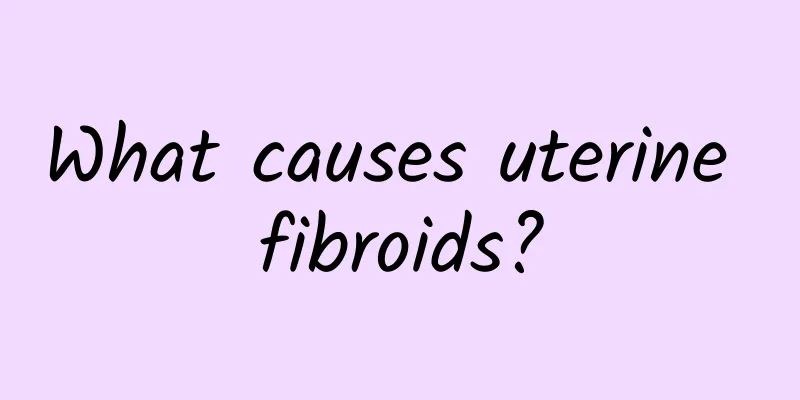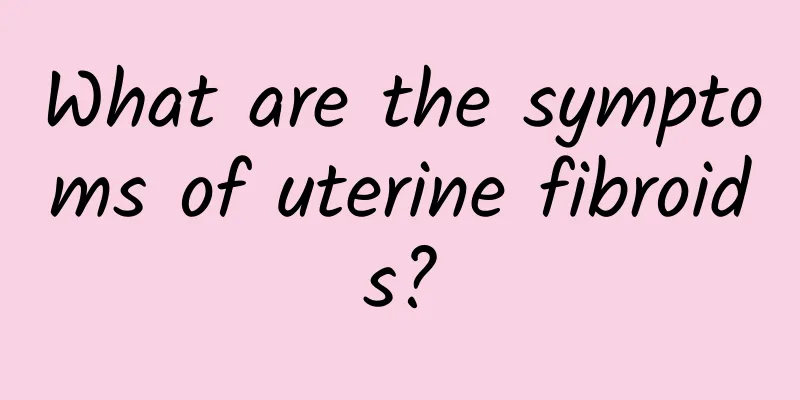What causes uterine fibroids?

|
The formation of uterine fibroids is usually related to genetics, hormone imbalance, environmental factors, and certain physiological or pathological changes. The risk of occurrence can be effectively reduced by controlling hormone secretion, improving lifestyle habits, and monitoring early symptoms. 1. Genetic factors Uterine fibroids have a certain genetic tendency. If a direct relative in the family, such as a mother or sister, has a history of uterine fibroids, the chance of developing it may be higher. This is because the relevant genes may cause abnormal proliferation of uterine smooth muscle cells. For those with a family history of the disease, regular gynecological examinations can be performed to detect problems as early as possible. 2. Hormone imbalance Fluctuations in estrogen and progesterone levels are important causes of uterine fibroids. Excessive secretion of these two hormones stimulates the rapid growth of uterine myometrial cells, thus forming fibroids. For example, pregnancy or long-term oral contraceptives may lead to elevated estrogen levels, but hormone imbalance is not the only cause. After menopause, due to the decrease in estrogen secretion, fibroids often stop growing or even shrink. Young women are advised to avoid long-term use of hormone drugs, especially the abuse of hormone drugs without the guidance of a doctor. 3 Environmental and lifestyle factors Long-term psychological stress, obesity, lack of exercise and unhealthy eating habits may indirectly affect hormone balance and increase the incidence of fibroids. For example, a high-fat, high-sugar diet can easily increase estrogen secretion, and chronic stress can interfere with endocrine function through the central nervous system. It is recommended to maintain healthy living habits, consume more fiber-rich foods such as green vegetables and whole grains, reduce the intake of high-fat foods, and develop the habit of regular exercise. 4 Pathological factors The formation of uterine fibroids may be related to certain pathological changes, such as other uterine diseases such as endometrial hyperplasia, chronic uterine inflammation, or trauma such as uterine damage caused by artificial abortion or intrauterine operation. Repeated damage to the uterus may induce abnormal cell proliferation and eventually form fibroids. Avoiding unnecessary intrauterine surgery and choosing appropriate contraceptive methods can reduce uterine trauma. 5 Hormone replacement therapy and drug factors Certain drugs, such as estrogen supplements, may induce rapid growth of fibroids. If women taking hormone therapy find abnormal vaginal bleeding or abdominal discomfort during non-menstrual periods, they should consult as soon as possible to consider changing or adjusting their treatment plan. During treatment, regular checkups can help detect possible side effects of the drug in a timely manner. The formation of uterine fibroids is the result of the combined effects of many factors. Women should pay attention to regular gynecological examinations, especially those with high-risk factors. When early symptoms such as heavy menstrual flow and abdominal pain are found, seek medical attention in time to avoid worsening of the disease or other complications. By improving health awareness and scientifically managing one's own health, the occurrence and development of uterine fibroids can be effectively prevented. |
<<: What are the minimally invasive treatments for uterine fibroids?
>>: What to do if your uterus is prolapsed
Recommend
Why are my legs so thick? 3 major physical conditions to pay attention to
When it comes to beautiful legs, there is no woma...
Can ovarian cysts be passed on to children?
In recent years, ovarian cysts have brought a lot...
How to treat pelvic inflammatory disease so that it does not recur?
Many women find that pelvic inflammatory disease ...
What is chronic cervicitis? How to prevent chronic cervicitis in women?
Many people may be unfamiliar with the term chron...
What are the causes of delayed menstruation? What are the nursing methods for delayed menstruation?
To prevent irregular menstruation, women must pay...
Treatment of uterine fibroids
Symptoms of uterine fibroids mainly include irreg...
Will menopause heal on its own?
Menopause is a common gynecological disease, whic...
What are the causes of habitual miscarriage and what are the treatments?
The pain caused by habitual miscarriage is self-e...
Five-star confinement for laying hens! Can play and sharpen claws Humane breeding
According to statistics, there are currently abou...
Why is there redness and swelling below during menstruation?
Why does redness and swelling occur during menstr...
Quench your hunger! Ginger soup warms the stomach and increases satiety
As winter approaches, does your appetite increase...
The following are some surgical methods for painless abortion
Painless abortion is a common abortion method in ...
Women with fallopian tube disease are more likely to have ectopic pregnancy
Women with various lesions in the fallopian tubes...
See how Chinese medicine can solve dysmenorrhea and how to treat it
"How to treat dysmenorrhea" is a topic ...
Who is suitable for ovarian cystectomy?
Ovarian cystectomy is a direct and effective trea...









